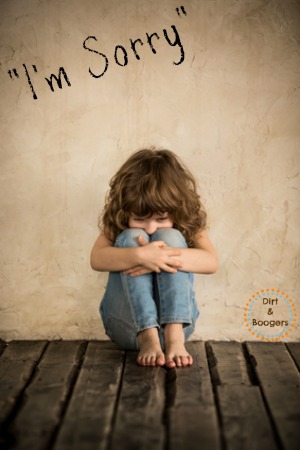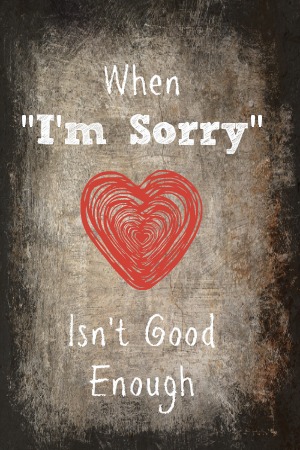When it comes to raising children, teaching them how to be apologetic can be difficult. So many times we see children giving filppant apologies or not saying it at all.
Then when they do say their sorry, and mean it, they don’t know what to do from there.
I remember making mistakes as a child and getting in trouble. I’d always say I was sorry, and my Mom would follow up with.
“I’m sorry isn’t good enough”.
The problem was that I really was sorry, but my apology wasn’t enough to make it better. I wanted to show her that I was sorry. I remember asking her what I needed to do to make it up to her or make it right, and she’d repeat “I don’t know, but I’m sorry just isn’t good enough”.
It felt terrible.
I didn’t have to tools to make it right, and she didn’t know what I could do to make it right either. I’m sure we both felt helpless.
When I think about how I want to raise my children, I want them to know how to be sympathetic, and how to make amends.
This is something that can be difficult and tricky. As their parent, it’s my job to teach them.
Here’s what I’m doing so far:
Model it for them: I always, always apologize to my kids when I mess up or hurt their feelings. Children learn mainly from watching us. They pick up on how we treat them, and in turn, will treat others the same way.
Point out other’s feelings: When my son hurts someone, I make sure that he recognizes that he’s done so. I show him that the other person is crying and upset. From there we talk about what happened and what he could do to make that person feel better.
Talk it through: We are big talkers around here. If there’s a problem, we talk it through and problem solve together. If my children say mean words, we talk about it. I remind them that the words they are using are not ok, and that they need to find better words.
We also talk about the emotion behind their words. “I hear that you are saying some really not nice things right now, and you seem upset. Let’s talk about that.” Then we talk it through. After the problem is solved, I remind them that they started off being pretty mean and that it’s important to apologize when we say mean things.
Have them fix it: My children know that it’s their responsibility to repair, clean, or fix something if they break it. If they write on the walls, it’s up to them to get the marks off. It’s important that they take responsibility for their mistakes by trying to fix it.
When my children get a bit older and have allowances, they will have to pay to have something fixed or replaced. If they don’t have the money, then they will work around the house to earn it.
Don’t demand an apology: I don’t force my kids to apologize, but I do remind them when an apology is appropriate. I want them to feel remorseful when they apologize. I don’t want them to just say it flippantly because they are supposed to.
I will tell you, because we model how to apologize for them, they usually say it without having to be reminded. Usually, not always.
I hope that I can give my children the tools to seek forgiveness when they mess up. I hope that they never feel like they don’t know how to make amends with someone, like I did.
Read more about how I apologize and talk to my children:
- Yelling and Asking for Forgiveness
- Apologizing to Kids: Who’s Taking the Blame?
- Problem Solving with a Preschooler…Talking it Out
**********************************
Join the thousands of others who subscribe to our weekly newsletter, so you can stay up to date with everything happening on Dirt and Boogers. No spam…I promise!
[embed_popupally_pro popup_id=”2″]



Love this post, Amanda! I’ve been thinking a lot about this issue lately with my three-year-olds. My husband is a big “Say you’re sorry” person…I might just send him your article as a loving nudge to see a different point of view 😉
Thanks Stephanie. I hope this post helps you guys out with your kids. I think I’m on the right track, and it’s been working really well for us so far!
Good tips. I need to think of these things when they happen.
Great list. I also don’t make my children say “I’m sorry”. When they are forced to say it they don’t mean it. When they realize what their actions have done and you talk it out, I find 90% of the time they say sorry on their own.
We are teaching our kids the differences of when to say I am sorry versus I was wrong. Sorry is when it was an accident (bumped by accident, spilled juice, unintentional things) that still hurt someone or their feelings. I was wrong is for intentional actions (hitting, taking someone else’s, ill intent, mean language, harm physical or to emotions). Children and adults need to learn the difference and the what is shows about the heart at this time. B I was wrong is followed by please forgive me. If appropriate a hug for sorry or wrong. And I say I am sorry or wrong too because I am imperfect too and they need to see kindness and forgiveness modeled my me.